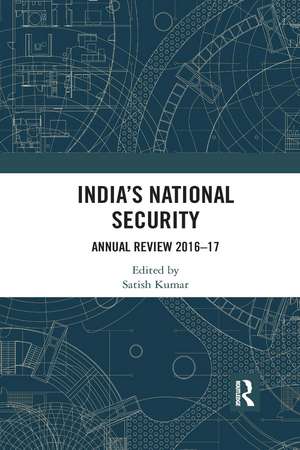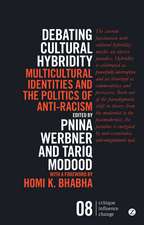India’s National Security: Annual Review 2016-17
Editat de Satish Kumaren Limba Engleză Paperback – 18 dec 2020
The major powers have been thus groping for suitable responses to their threat perceptions. It is in this kind of a complex and confusing international environment that India, as a rising power, has been called upon to wade through its strategic partnerships with major powers and nurture friendships with various Asian and African countries.
This sixteenth volume of India’s National Security Annual Review offers indispensable information and evaluation on matters pertaining to national security. It undertakes a thorough analysis of the trends to provide a backdrop to India’s engagement with various countries. The volume also discusses persisting threats from China and Pakistan.
With contributions from experts from the fields of diplomacy, academia, and civil and military services, the book will be one of the most dependable sources of analyses for scholars of international relations, foreign policy, defence and strategic studies, and political science, and practitioners alike.
| Toate formatele și edițiile | Preț | Express |
|---|---|---|
| Paperback (3) | 268.62 lei 6-8 săpt. | |
| Taylor & Francis – 18 dec 2020 | 268.62 lei 6-8 săpt. | |
| Taylor & Francis – 21 ian 2016 | 449.41 lei 6-8 săpt. | |
| Taylor & Francis – 21 ian 2016 | 470.94 lei 6-8 săpt. | |
| Hardback (3) | 712.10 lei 6-8 săpt. | |
| Taylor & Francis – 12 iun 2012 | 712.10 lei 6-8 săpt. | |
| Taylor & Francis – 29 noi 2017 | 1007.36 lei 6-8 săpt. | |
| Taylor & Francis – 27 iun 2013 | 1171.54 lei 6-8 săpt. |
Preț: 268.62 lei
Preț vechi: 315.92 lei
-15% Nou
Puncte Express: 403
Preț estimativ în valută:
51.41€ • 53.47$ • 42.44£
51.41€ • 53.47$ • 42.44£
Carte tipărită la comandă
Livrare economică 14-28 aprilie
Preluare comenzi: 021 569.72.76
Specificații
ISBN-13: 9780367735517
ISBN-10: 0367735512
Pagini: 476
Dimensiuni: 138 x 216 mm
Greutate: 0.88 kg
Ediția:1
Editura: Taylor & Francis
Colecția Routledge India
Locul publicării:Oxford, United Kingdom
ISBN-10: 0367735512
Pagini: 476
Dimensiuni: 138 x 216 mm
Greutate: 0.88 kg
Ediția:1
Editura: Taylor & Francis
Colecția Routledge India
Locul publicării:Oxford, United Kingdom
Public țintă
PostgraduateCuprins
Governing Board. Editorial Board. About the Editor. List of Illustrations. List of Tables. List of Contributors. Preface 1. Introduction I. National Security Review 2. National Security Environment (i) Global Security Trends (ii) External Security Situation – I (US, China, Russia, Europe, Japan, Pakistan) (iii) External Security Situation – II (Asia, Africa) (iv) Internal Security Developments (v) India’s Defence Initiatives II. India’s Security Zone 3. India–Iran Relations: Potential and Challenges 4. India’s Gulf Agenda: From Strategic Diffidence to Active Equidistance 5. New Vistas in India–Myanmar Relations 6. Indian Ocean Strategy and Vulnerabilities III. Challenges for India 7. ‘Make in India’ for Military Needs: A View from the Private Sector 8. Water Security: Need for Paradigm Shift 9. Islamic Radicalisation in South Asia 10. Strategic Motivations for India’s Cybersecurity: Risks, Capabilities and Promises IV. Assessing Internal Security 11. Youth, Employment and National Security 12. Agricultural Productivity in National Security Planning 13. Border Management for National Security 14. Left-Wing Extremist Movement: Dynamics and Complexities V. Changing Security Environment 15. China’s Anti-Access Area Denial (A2AD) Strategy 16. India’s Strategic Landscape, Hybrid Threats and Likely Operational Scenarios 17. Global Governance Reforms: Prospects for India VI. National Security Assessment: Unmitigated Threats, Diffident Responses. Index
Notă biografică
Satish Kumar is former Professor of Diplomacy at Jawaharlal Nehru University and currently Director at the Foundation for National Security Research, New Delhi, India. As an eminent scholar in the field of International Relations, he has held several distinguished positions, including Counselor of International Relations, Academy for World Watch, Shanghai; Distinguished Fellow, Institute of Peace and Conflicts Studies, New Delhi; MEA Chair, United Service Institution of India, New Delhi; India Chair, University of World Economy and Diplomacy, Tashkent; Visiting Professor in International Relations, University of Turin, Italy; Visiting Fellow, Institute of International Studies, University of California, Berkeley; Visiting Fellow, School of Advanced International Studies, The Johns Hopkins University, Washington D.C.; and Director, Indian Foreign Service Probationers Training Course conducted by the School of International Studies, JNU. He participated in numerous international conferences and delivered special lectures at several universities and think-tanks across the world. Professor Kumar was also a columnist for the Hindustan Times (1971–78). Since 1991, he has been a member of the Indian delegation to the India–Pakistan Track II dialogue called the ‘Neemrana Initiative’. He has authored/edited over two dozen books and numerous research articles.
Recenzii
‘As in previous years, it is an invaluable compendium of analysis on matters relating to our national security.’
M. Hamid Ansari, former Vice-President of India
‘This edited collection of essays harnesses insights from national security ‘practitioners’ — defence personnel, diplomats, intelligence officers, business leaders and academics —to offer a snapshot of India’s security domain(s).’
Rina Kashyap, Head of Department of Political Science, Lady Shri Ram College, New Delhi, India (in The Financial Express)
‘This series is unique in two ways: first, this presents authoritative assessments on the complex and evolving security environment in India, indicating both challenges and opportunities and second, it serves as a channel for offering the views of experts on important security issues to the policy makers, opinion shapers and scholars.’
S. D. Pradhan, Former Deputy National Security Adviser, Government of India (in The Asian Age)
‘This publication has consistently addressed issues related to India’s national security in a comprehensive manner. My compliments to the editor and members of the editorial board for the efforts in compiling this publication’
Admiral Sunil Lanba, Chief of Naval Staff of India
‘The annual INSAR has established itself as an indispensable reference document on India's foreign and security policies for foreign affairs scholars and practitioners alike.’
Shyam Saran, Former Chairman, National Security Advisory Board, Government of India
M. Hamid Ansari, former Vice-President of India
‘This edited collection of essays harnesses insights from national security ‘practitioners’ — defence personnel, diplomats, intelligence officers, business leaders and academics —to offer a snapshot of India’s security domain(s).’
Rina Kashyap, Head of Department of Political Science, Lady Shri Ram College, New Delhi, India (in The Financial Express)
‘This series is unique in two ways: first, this presents authoritative assessments on the complex and evolving security environment in India, indicating both challenges and opportunities and second, it serves as a channel for offering the views of experts on important security issues to the policy makers, opinion shapers and scholars.’
S. D. Pradhan, Former Deputy National Security Adviser, Government of India (in The Asian Age)
‘This publication has consistently addressed issues related to India’s national security in a comprehensive manner. My compliments to the editor and members of the editorial board for the efforts in compiling this publication’
Admiral Sunil Lanba, Chief of Naval Staff of India
‘The annual INSAR has established itself as an indispensable reference document on India's foreign and security policies for foreign affairs scholars and practitioners alike.’
Shyam Saran, Former Chairman, National Security Advisory Board, Government of India
Descriere
The global security environment in the last five years has been characterised by a state of ‘no war, no peace’ among major powers, resulting in a state of uncertainty about their national security objectives. For instance, the United States has been concerned about the attitudes of Iran, Russia, North Korea, China, and others, and yet did not ex






